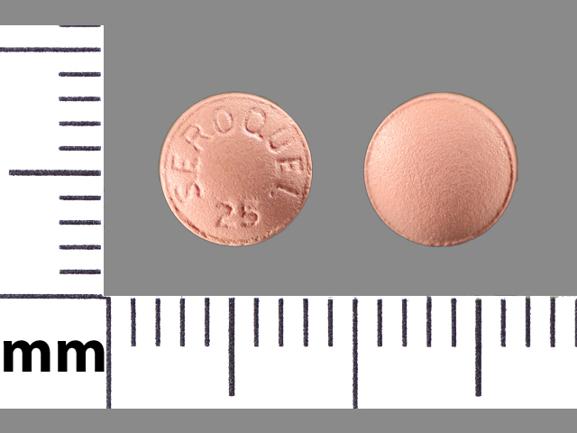Seroquel and Alcohol/Food Interactions
There are 6 alcohol/food/lifestyle interactions with Seroquel (quetiapine).
Alcohol (Ethanol) Quetiapine
Minor Drug Interaction
Information for this minor interaction is available on the professional version.
Switch to professional interaction data
Quetiapine Obesity
Moderate Potential Hazard, Moderate plausibility
atypical antipsychotic agents - hyperglycemia/diabetes
Hyperglycemia, in some cases extreme and associated with ketoacidosis or hyperosmolar coma or death, has been reported with the use of atypical antipsychotic agents. Patients with diabetes should be monitored for worsening control of blood glucose when treated with these agents. It is recommended that patients with risk factors for diabetes mellitus starting treatment with atypical antipsychotics should undergo fasting blood glucose testing at the beginning of treatment, and periodically thereafter. Any patient treated with atypical antipsychotics should be monitored for symptoms of hyperglycemia including polydipsia, polyuria, polyphagia, and weakness. Patients who develop symptoms of hyperglycemia during treatment with atypical antipsychotics should undergo fasting blood glucose testing. In some cases, hyperglycemia has resolved when treatment with these agents was discontinued; however, some patients required continuation of anti-diabetic treatment despite discontinuation of the atypical antipsychotic drug.
Quetiapine High Cholesterol (Hyperlipoproteinemia, Hypertriglyceridemia, Sitosterolemia)
Moderate Potential Hazard, Moderate plausibility
atypical antipsychotic agents - lipid alterations
Atypical antipsychotic drugs have been associated with undesirable alterations in lipid levels. While all agents in the class have been shown to produce some changes, each drug has its own specific risk profile. Before or soon after initiation of antipsychotic medications, a fasting lipid profile should be obtained at baseline and monitored periodically during treatment.
Quetiapine Obesity
Moderate Potential Hazard, Moderate plausibility
atypical antipsychotic agents - weight gain
Weight gain has been observed with atypical antipsychotic use. While all agents in the class have been shown to produce some changes, each drug has its own specific risk profile. When treating pediatric patients with atypical antipsychotic agents, weight gain should be monitored and assessed against that expected for normal growth. Monitor weight at baseline and frequently thereafter.
Quetiapine High Cholesterol (Hyperlipoproteinemia, Hypertriglyceridemia, Sitosterolemia)
Moderate Potential Hazard, Moderate plausibility
quetiapine - hyperlipidemia
According to the manufacturer, patients treated with quetiapine in 3- to 6-week placebo-controlled trials had increases in cholesterol and triglyceride of 11% and 17%, respectively, compared to slight decreases in the placebo group. Patients with preexisting hyperlipidemia may require closer monitoring during quetiapine therapy, and adjustments made accordingly in their lipid-lowering regimen.
Quetiapine High Blood Pressure (Hypertension)
Moderate Potential Hazard, Moderate plausibility
quetiapine - increase systolic and diastolic blood pressure
The use of quetiapine may be associated with in increase systolic and diastolic blood pressure in children and adolescents. During the 26 week open-label clinical trial, one child with a reported history of hypertension experienced a hypertensive crisis. Blood pressure in children and adolescents should be measured at the beginning of, and periodically during treatment with quetiapine.
Switch to professional interaction data
Seroquel drug interactions
There are 745 drug interactions with Seroquel (quetiapine).
Seroquel disease interactions
There are 23 disease interactions with Seroquel (quetiapine) which include:
- suicidality
- dementia
- QT Prolongation
- acute alcohol intoxication
- CNS depression
- NMS
- aspiration
- seizure
- hematologic abnormalities
- hyperglycemia/diabetes
- hypotension
- lipid alterations
- priapism
- weight gain
- hyperprolactinemia
- liver disease
- parkinsonism
- tardive dyskinesia
- ALT elevations
- cataracts
- hyperlipidemia
- hypothyroidism
- increase systolic and diastolic blood pressure
More about Seroquel (quetiapine)
- Seroquel consumer information
- Check interactions
- Compare alternatives
- Pricing & coupons
- Reviews (695)
- Drug images
- Side effects
- Dosage information
- Patient tips
- During pregnancy
- Generic availability
- Support group
- Drug class: atypical antipsychotics
- Breastfeeding
- En español
Related treatment guides
Drug Interaction Classification
| Highly clinically significant. Avoid combinations; the risk of the interaction outweighs the benefit. | |
| Moderately clinically significant. Usually avoid combinations; use it only under special circumstances. | |
| Minimally clinically significant. Minimize risk; assess risk and consider an alternative drug, take steps to circumvent the interaction risk and/or institute a monitoring plan. | |
| No interaction information available. |
Further information
Always consult your healthcare provider to ensure the information displayed on this page applies to your personal circumstances.


